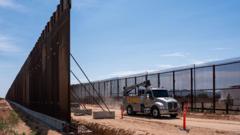In a move signaling a shift in trade relations, Canadian Prime Minister Mark Carney declared on Friday that Canada will reduce some of its retaliatory tariffs on US goods while maintaining significant levies on the automotive and metals sectors. This decision follows a recent phone discussion with US President Donald Trump as both nations aim to renegotiate their trade agreement after missing an earlier deadline.
Canada Eases Tariffs on US Goods Amid Trade Tensions

Canada Eases Tariffs on US Goods Amid Trade Tensions
Canada announces partial rollback of tariffs on US imports, but retains key levies.
The rollback will see Canada lifting a 25% tariff on approximately C$30 billion (around $21.7 billion) worth of American products including consumer goods like orange juice and washing machines. Carney indicated that Canada’s tariffs would be harmonized with the US-Mexico-Canada free trade agreement (USMCA), believed to help restore free trade for a substantial portion of goods exchanged between the two countries. The change is expected to take effect on September 1.
Although the reduction has been welcomed by the White House as a positive development, Carney faced criticism from opposition leader Pierre Poilievre, who accused him of conceding too much to the US. The Prime Minister defended the decision, emphasizing that despite the adjustments, Canada's overall tariff rates remain competitive when compared to other nations.
Looking forward, Carney acknowledged the priority of addressing ongoing disputes linked to the automotive, steel, aluminum, and lumber industries, particularly in light of new tariffs imposed by the US. The trade atmosphere remains complex, with Canadian businesses raising alarms over job losses and operational difficulties stemming from the US tariffs, especially in Ontario's auto manufacturing sector.
With ongoing negotiations looming, both countries appear poised to navigate a delicate path forward in their economic relationship.
Although the reduction has been welcomed by the White House as a positive development, Carney faced criticism from opposition leader Pierre Poilievre, who accused him of conceding too much to the US. The Prime Minister defended the decision, emphasizing that despite the adjustments, Canada's overall tariff rates remain competitive when compared to other nations.
Looking forward, Carney acknowledged the priority of addressing ongoing disputes linked to the automotive, steel, aluminum, and lumber industries, particularly in light of new tariffs imposed by the US. The trade atmosphere remains complex, with Canadian businesses raising alarms over job losses and operational difficulties stemming from the US tariffs, especially in Ontario's auto manufacturing sector.
With ongoing negotiations looming, both countries appear poised to navigate a delicate path forward in their economic relationship.



















